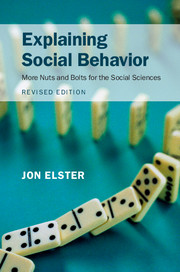5 - Self-interest and altruism
from II - The Mind
Published online by Cambridge University Press: 05 August 2015
Summary
Motivation and behavior
The contrast between self-interested and altruistic motivations is deceptively simple. As a first approximation, let us understand an altruistic motivation as the desire to enhance the welfare of others even at a net welfare loss to oneself, and an altruistic act as an action for which an altruistic motivation provides a sufficient reason. If I see you give money to a beggar in the street I call it an altruistic act because it is an action that could spring from altruistic motivations, whether or not it actually does.
For a more complex example, consider the experimental findings on “altruistic punishment.” In these studies, one subject A has the option of punishing another subject B for non-cooperative behavior, at some cost to himself. There is no face-to-face interaction and the two subjects will never meet again. Yet many subjects use the punishment option, causing B to be more cooperative in his later dealings with a third party C. The punishment could spring from altruistic motivations, if A anticipates, and is motivated by, the benefit his punishment of B confers on C. In reality, it is more likely to be motivated by a desire for revenge.
There are many instances of such behavior outside the laboratory. In eighteenth-century France, peasants usually granted requests by beggars and vagrants for dinner and lodgings. If a peasant refused, he risked seeing his trees felled, his beasts mutilated, and his house burned down, acts of destruction that produced no benefit to the beggars and involved a risk of being caught. Although there is no reason to believe that they were in fact motivated by a desire to make the peasant take in future beggars, that motivation would be sufficient to explain them. In preindustrial England, urban food riots caused by the high prices of bread invariably ended in failure – producing nothing but “a few ruined mills and victims on the gallows,” as the historian of these movements writes. Yet by virtue of their nuisance value the rebellions had a long-term success in making the propertied classes behave more moderately than they would have done otherwise.
- Type
- Chapter
- Information
- Explaining Social BehaviorMore Nuts and Bolts for the Social Sciences, pp. 84 - 98Publisher: Cambridge University PressPrint publication year: 2015

